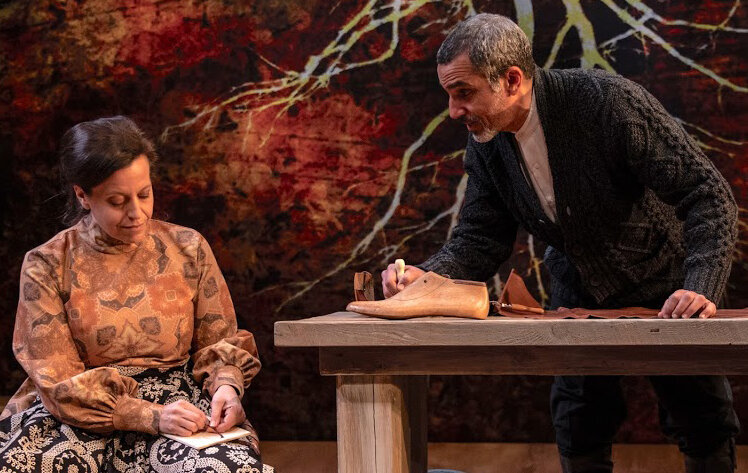Brittany Anikka Liu as Lidia appeals to J. Paul Nicholas as a Russian landowner in The Artist, Miles Malleson’s adaptation of an Anton Chekhov short story as part of the Mint Theater Company’s production of Chekhov/Tolstoy: Love Stories.
The Mint Theater Company has once again returned to excavating the long-forgotten dramatic works of Miles Malleson, a 20th-century British actor, playwright, and screenwriter. Chekhov/Tolstoy: Love Stories presents a pair of one-act dramas based on short stories by the Russian literary giants and adapted by Malleson. Audience members with passing familiarity of works by Anton Chekhov and Leo Tolstoy will surely not expect to see a rom-com double bill, and yet the plays reflect the authors’ depths of compassion and devotion to social and spiritual uplift.
Katie Firth as the Mother in The Artist admires the work of Nicov, played by Alexander Sokovikov.
The Artist, based on Chekhov’s “An Artist’s Story,” takes place in the garden of a Russian country house and addresses issues explored in many of the writer’s plays and fiction. The one-act begins with Genya (Anna Lentz), a wistful young woman pining over Nicov (Alexander Sokovikov), a landscape painter and lodger at a nearby estate. Nicov has withdrawn from society because he believes that genuine social change can occur not through manual and intellectual labor but through metaphysical contemplation. He philosophizes:
The highest vocation of man is spiritual activity, spiritual effort—the perpetual search for truth and the meaning of life. And when a man has recognized that vocation he can only be satisfied by religion, by science, by philosophy, by art, by the great things—and nothing else. And then, and not till then, civilization will mean freedom.
Nicov’s ideals are put to the test by Genya’s sister Lidia (Brittany Anikka Liu), who is a social activist and humanitarian firebrand. She counters the artist’s stance by affirming that class elevation can only be achieved through work, education, and healing the sick. She is impatient with anyone who feels otherwise.
Vinie Burrows is Aniuska, a plucky nanny, in Michael. Photographs by Maria Baranova.
Directed by Jonathan Bank, The Artist offers a forceful intellectual argument, but it lacks the simmering passion and inevitable heartbreak that are hallmarks of Chekhovian tragicomedies. There is a pervading sense of ennui, and the actors do not generate enough emotional energy to give pulsing life to the play’s cerebral ideas.
Much more successful is Michael, Malleson’s adaptation of Tolstoy’s “What Men Live By.” Structured as a moral fable and highlighting Tolstoy’s commitment to pacifist Christianity, the play calls to mind the Southern grotesque elements of Flannery O’Connor and the magical realism of Gabriel García Márquez. Michael revolves around Simon, a peasant shoemaker (J. Paul Nicholas), and his overworked wife Matryona (Katie Firth). Their fortune changes, though, when Simon, behaving like the Good Samaritan, brings a poor beggar named Michael (Malik Reed) to live with them and their nanny (Vinie Burrows). In the course of a year, the shoemaker with the help of his new assistant can scarcely keep up with the shoe orders, and news of his craftsmanship even reaches Russian nobility. In more ways than one, Michael might just be a godsend.
The actors, under the direction of Jane Shaw, effectively convey the archetypal, fairytale-like qualities while grounding the characters in gritty realism. Firth gives a finely etched performance as the harried shoemaker’s wife, and, as her husband, Nicholas is a moving Everyman. As the enigmatic beggar, Reed is suitably mysterious, and he and Burrows (who, at 95, darts around the stage like a 20-year-old) share a powerful moment of spiritual connection.
The shoemaker’s wife (Firth) keeps the accounts of her husband (Nicholas) in Michael, Malleson’s adaptation of a short story by Leo Tolstoy. Photographs by Maria Baranova.
The plays benefit from simple yet evocative design. Oana Boetez’s costumes, Matthew Richards’s lighting, and Shaw’s sound establish the atmosphere of 19th-century Russia. Most impressive, however, is Roger Hanna’s scenic design, which effectively distinguishes the mood and tone for each play. The Artist, for instance, uses a painterly landscape backdrop with a detailed depiction of a tree and its many branches full of leaves. The image scrolls up for Michael, and the backdrop becomes the symbolic reversal and represents the roots of the tree. Upon closer inspection, it also looks like a diagram of a human heart with its veins and ventricles.
The effect is especially fitting. In his adaptations, Malleson shows that although Chekhov and Tolstoy were contemporaries, they had very different ways of seeing, feeling, and representing the complexities of human existence.
The Mint Theater Company’s production of Chekhov/Tolstoy: Love Stories plays through March 14 at Theatre Row (410 W 42nd St. between 9th and Dyer Avenues). Evening performances are at 7:30 p.m., Tuesday through Saturday; matinees are at 2 p.m. on Saturdays, Sundays, and Wednesdays. For tickets and performance information, visit minttheater.org.






